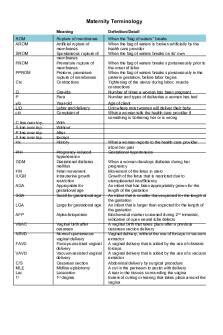Medical Terminology Discussions PDF

| Title | Medical Terminology Discussions |
|---|---|
| Course | Medical Terminology |
| Institution | California Polytechnic State University San Luis Obispo |
| Pages | 4 |
| File Size | 80.2 KB |
| File Type | |
| Total Downloads | 73 |
| Total Views | 145 |
Summary
All the assignments, and my responses to them, for the mandatory forum assignments!...
Description
Medical Terminology Discussion Forum #1 (all posts and replies due 9/30 at 11 pm)
I am a biology major with a concentration in anatomy and physiology. I don't have much experience with online classes, except for a US history class that I took the summer before my senior year, when I moved to California and had to do last minute to meet the graduation requirements! However I assume that this course will be much different and a lot harder, as well as something I'm actually interested in, so it is difficult to put them on the same level. My experience with learning a new language started when I was about 10 learning French. I never took language courses really, but immersed myself into a French speaking environment to learn it. Now I am more or less fluent in French and did 2016-2017 academic year in Paris, taking biology courses in French. Through this and many doctors appointments for mysterious “boutons” that were showing up after having 186 mosquito bites on my body at one time, I realised how many of the technical words used in biology and medical fields are very similar because they have the same roots. I took a bit of Spanish, but then switched to German when I was struggling learning French and Spanish concurrently, but never was very good at either of them and haven’t tried speaking either in a very long time! I am taking this course because I am not completely sure what I want to do after I graduate. I currently have two options that I am thinking of. One would be going back to France to do research or one of those would be staying in the US and working as a medical assistant for a couple years before PA school. I worked as a medical scribe for my last year in California, and very closely with the MAs and it made me realise how valuable a course like this would be. So overall, I’m taking this course to leave my options open for after I graduate and to help me out in one of my possible future jobs! In my free time I enjoy brewing beer with my roommates, playing with our pet snake and rollerblading on sunny days!
Discussion Forum #2 (all posts and replies due 9/30 at 11 pm) There are two parts to this discussion forum. You may earn up to 10 points for participating in this discussion. 1. Click on the discussion topic below. 2. Discuss the importance of proper communication of medical language. Include the five language skills in your discussion. Posts should be a minimum of 300 words. 2. After the 30 minute editing window expires, reply to at least two of your peers. Replies should be a minimum of 100 words.
You may here that “communication is key to a happy and healthy relationship” all the time, but in my opinion communication is even more important in the medical community! Proper terminology and communication are important for various reasons. First of all, many patients are seen by multiple doctors. With standardised jargon, there is universal understanding of records to be able to properly assess previous problems and treatments that patients have had, whether within your practice or from a previous healthcare provider. It leaves less room for subjectivity and leads to a more objective and complete view on the patient's history and present condition.
This not only helps with communication between doctors in separate practices, but with communication between coworkers in a single practice. It is more simple and leaves less room for error if everyone is on the same page and all can understand accurately each other's work. This line of communication continues as records are passed to insurance companies or lawyers. Personally I do not think that any one of the skills (reading, listening, thinking/analysing/understanding, writing/typing/spelling, speaking/pronouncing) is more important than the others, as they all overlap and are necessary for each other. For example in my old job as a medical scribe, if I was too focused on documenting the PE (physical examination) on the computer and not watching the exam, I would often have to ask my boss to clarify. This came up most with the words abduction and adduction which are very common on our physical exams and have opposite meanings and loss of motions in each can be signs of completely different problems. When we encountered this problem it included mistakes in multiple parts of the five language skills. On my part, it went from not completely focusing while listening, leading to problems with thinking, analysing and understanding the values he was telling me and then the lack of ability to convey that in writing (typing.) On my boss's side, he was focused on the patient and the thinking/analysing portion that it led to mumbling while speaking and unclear pronouncing causing a lack of understanding for me. Although this situation does not involve the reading aspect, it would later on as one of us or a medical assistant in our office tried to read the medical records later on.
Hey Megan, You bring up a lot of good points in your discussion! I never really thought about the effects of spelling, but as I am working through the chapter for this class I am definitely noticing how a couple letters could completely change the meaning of a word. The analysing you brought up in labs and radiology can also be very interesting because as a medical professional you can take an scan and sometimes see it as something completely different than the radiologist may have seen! As you said, medical terms are not used and heard as often in day to day life, but I find it very interesting (and confusing) how often medical terminology can sound very similar to words we use all the time even though they may have completely different spellings and meanings! Hi Rose, I completely agree with you (and Cameron) no one wants to hear that patient being prescribed the wrong medication based off of a communication error! I couldn't imagine the guilt over hurting a patient for something like that. That would be awful! I also thought the point that you brought up about making the patient feel comfortable very interesting. However, I think a big part of that is actually being able to use more day to day words that a patient would understand. From my experience, patients often find medical professionals that use too much jargon very intimidating and therefore less trustworthy. That's a crazy story Cameron, good catch! I cannot even imagine what it would be like to come out of surgery to find out that it had been performed on the wrong side, even for minor surgeries. That is interesting however, how this mistake could have come from such a large variety of people who were involved in the situation. I have heard stories where unfortunately doctors do many mistakes like this,
including ones as serious as amputating the wrong leg!!! I really don't understand how people could be so careless in situations like those because which limb must have been mentioned many times in the medical record.
There are two parts to this discussion forum. All posts and replies are due by October 21 at 11:00 pm. I encourage you to complete this discussion sooner than later though. 1. Review the two scenarios on page 2 of your textbook. What are your thoughts about these scenarios? What are the similarities and differences between the two? Can you relate to the feelings described? Posts should be a minimum of 300 words. 2. After the 30 minute editing window expires, reply to at least two of your peers. Replies should be a minimum of 100 words.
As someone who has moved around internationally and traveled out of the US a lot, I can definitely relate to scenario 1! Sometimes you regret it, but sometimes it’s the best way to learn. Personally I feel like it is best to learn the basics but then learn the bulk of the information in the actual situation. However, for example this summer I managed to have 3 hour dinners with people that I didn't speak a word of the same language as me (and I still receive constant messages from them in Greek and Albanian!) and still managed to communicate, so I also understand the importance of nonverbal communication and adapting to the situation! You can also learn by throwing yourself into a situation, even though that’s the hard way. I did have similar feelings of this when I started working as a medical scribe. I didn’t understand a lot of what my coworkers were saying and often felt lost. Unlike some scribe programs, for the doctor I worked for just has people shaddow to learn, but the girl I was shadowing my first week got sick was sick so i just got thrown in to learn alone! The charts may have been a mess for that week, but I definitely learned faster than I would have through shadowing. Although I have been very lucky with finding my way and meeting great people, scenario 2 is definitely the easy way to do it! This is definitely closer to how I felt the second time I moved to France. After knowing the language, it was so much easier to make friends and integrate into the culture. Luckily after taking this course, the next time I get a job in the medical field, I will be a lot more adapt and be able to be even more successful.
(I apologize for any mistakes, I really tried but unfortunately have a concussion, am not actually allowed to do school work because of it and can't really think straight, but deadlines exist so here you go!)
Hey Caitlin, I definitely agree with you about the importance of immersion into a new language or culture for truly learning something effectively. I also agree that when you're working in a life or death situation that's completely different situation. That was the only time that being in countries that I didn't speak the
language freaked me out. Just going into pharmacies with a google translated version of what I needed on my phone and walking out with a box I couldn't read didn't make me feel very comfortable. You're very right that being able to learn about medical language in the comfort of our own homes or the library is a better way to learn this, before being thrown in somewhere we could end up hurting people! Good points Haley! Good points Haley! That's really cool that you can relate this to your training for your job as an EMT. And I have no doubt that your job as an EMT will further prepare you for confidence if you become a physician later on. It's nice to be able to learn in stepping stones! Do you feel that as you progress through this course, you become better apt to your training? Or do you feel that within your training you have already learned a lot of the material that you are learning in your class. I hope this class helps you succeed in both of those!...
Similar Free PDFs

Medical Terminology Discussions
- 4 Pages

Medical Terminology
- 50 Pages

Medical Terminology
- 6 Pages

Medical Terminology
- 2 Pages

Medical Terminology
- 4 Pages

Medical Terminology EXAM 2
- 4 Pages

Medical terminology Modules
- 158 Pages

Medical Terminology Terms
- 22 Pages

Medical Terminology-Plurals Quiz
- 3 Pages

Medical terminology 17
- 4 Pages

Med term - medical terminology
- 20 Pages

Medical Terminology Final Exam
- 5 Pages

Medical terminology 2
- 3 Pages

Medical terminology 22
- 2 Pages

Medical Terminology 2018
- 3 Pages
Popular Institutions
- Tinajero National High School - Annex
- Politeknik Caltex Riau
- Yokohama City University
- SGT University
- University of Al-Qadisiyah
- Divine Word College of Vigan
- Techniek College Rotterdam
- Universidade de Santiago
- Universiti Teknologi MARA Cawangan Johor Kampus Pasir Gudang
- Poltekkes Kemenkes Yogyakarta
- Baguio City National High School
- Colegio san marcos
- preparatoria uno
- Centro de Bachillerato Tecnológico Industrial y de Servicios No. 107
- Dalian Maritime University
- Quang Trung Secondary School
- Colegio Tecnológico en Informática
- Corporación Regional de Educación Superior
- Grupo CEDVA
- Dar Al Uloom University
- Centro de Estudios Preuniversitarios de la Universidad Nacional de Ingeniería
- 上智大学
- Aakash International School, Nuna Majara
- San Felipe Neri Catholic School
- Kang Chiao International School - New Taipei City
- Misamis Occidental National High School
- Institución Educativa Escuela Normal Juan Ladrilleros
- Kolehiyo ng Pantukan
- Batanes State College
- Instituto Continental
- Sekolah Menengah Kejuruan Kesehatan Kaltara (Tarakan)
- Colegio de La Inmaculada Concepcion - Cebu
